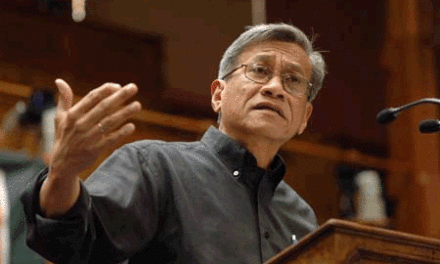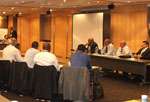(This article originally came out under the author’s commentary Perspective in Business World, Nov. 2, 2001.)
Desperate is the word to describe the antics of the trade superpowers on the eve of the Fourth Ministerial of the World Trade Organization (WTO) in Doha, Qatar.
Tremendous pressure is being exerted on developing countries to endorse a new round of trade negotiations, and the weapons include manipulation of the WTO’s undemocratic system of decision-making and blunter forms of trade blackmail.
The majority of developing countries want the Ministerial to focus on matters related to the implementation of the commitments made under the Uruguay Round. This position was laid out in a recent declaration of the Group of 77, which identified "104 implementation issues" that needed to be "meaningfully resolved, with urgency before the Fourth Ministerial Meeting and without any extraneous linkages."
Developing countries have simply been groaning under the weight of implementing the 28 different sub-agreements that comprised the Uruguay Round agreement, while the big trading powers have refused or been slow to implement their commitments to provide greater market access in agriculture and textiles to developing countries or cut back the massive subsidization of their agricultural interests.
The European Union and the United States have put some of their differences aside — temporarily — to present a common front for a new round of trade negotiations that would focus on the so-called ”new issues” of investment, competition policy, government procurement, and trade facilitation – essentially the same issues that formed their common agenda prior to the disastrous WTO Ministerial in December 1999.
Learning from Seattle, the EU and US have de-emphasized their disagreement on agricultural trade issues, and the US apparently does not intend to make the linkage between trade and labour standards–a key point of conflict with developing countries in Seattle–an issue in Doha.
Unbalanced Ministerial Draft
Despite this, many developing countries are up in arms over the draft declaration for the Ministerial meeting. To them, the document is an example of the sort of underhanded tactics that the big trading powers are resorting to. Proponents of the document say it is ”balanced”. The problem, however, lies in emphasis and nuance. According to Aileen Kwa, a Geneva-based analyst who monitors the WTO for Focus on the Global
South, the draft does not emphasize the priority that the majority of WTO members’ place on implementation issues, the ”Special and Differential Treatment” of developing countries, greater access to developed country markets, and reviews of the agreements on Trade Related Investment Measures (TRIMs), Trade Related Intellectual Property Rights (TRIPs), and services (GATS).
On the other hand, the draft projects an alleged consensus on negotiations on the issues of competition policy, investment, government procurement, and trade facilitation that are the priorities of the minority of rich and powerful trading countries.
”Despite clearly stated positions that the developing countries are unwilling to go into a new round until past implementation and decision-making are addressed," says Kwa, "the draft declaration favorably positions the launching of a comprehensive new round with an open agenda.”
The draft has been openly denounced by Nigeria as "one-sided" and "showing not much regard for our countries." Bitter complaints from the poor countries prompted Stuart Harbinson of Hong Kong, chair of the WTO General Council, to walk out of a briefing in Geneva.
Non-Transparent Processes at Work
The draft was a product of consultations conducted among an inner circle of about 20-25 participants — the so-called Green Room process that effectively excludes most of the members of the WTO. In the lead-up to Qatar, this exclusive process has already held two ”mini-ministerials”, one in Mexico at the end of August and another in Singapore on October 13-14.
How one gets invited to these meetings is a mystery to many. Kwa cites the case of one ambassador from a transition economy who was promised an invitation to a Green Room meeting but the WTO Secretariat but never got one. Then there was the case of an African ambassador who wanted to attend the Singapore mini-ministerial. When he approached the WTO secretariat for an invitation, he was told they were not hosting the meeting. When he tried the Singapore mission in Geneva, the response was they were dimply coordinating the meeting and were not in a position to send out invitations.
Developing country disaffection with the Green Room process was one of the reasons the Third Ministerial collapsed in 1999. At that time, Charlene Barshefsky, then US Trade Representative, admitted that the WTO decision-making process was non-transparent and inequitable and had to be changed. Stephen Byers, the UK Secretary of State for Trade and Industry, was even more emphatic, saying that the "WTO will not be able to continue in its present form. There has to be fundamental and radical change in order for it to meet the needs and aspirations of all 134 of its members."
That moment of candor was, however, forgotten quickly as the developed countries realized that in an organization like the WTO, where the developing countries are in the majority, the big powers can only dominate through such non-democratic mechanisms as the Green Room and the so-called ”Consensus System”.
Barely two months after Seattle, Mike Moore, WTO director general, told
developing countries at the UNCTAD X gathering in Bangkok in February 2000
that the Green Room/consensus system was ”non-negotiable”. And there the matter has lain ever since.
Capitalizing on Tragedy
The economic superpowers have not wasted any opportunity to push for a new trade round. The smoke had not yet cleared from the ruins of the World Trade Centre in New York before US Trade Representative Robert Zoellick and EU Trade Commissioner Pascal Lamy seized on the tragedy to press for even greater trade liberalization via the WTO and other mechanisms, asserting that free trade was one of the best ways of countering terrorism. Others have been more brazen: at a recent conference in Budapest, David Hartridge, an influential senior official at the WTO Secretariat, openly declared that the September 11 terrorists and activists against corporate-driven globalization shared a propensity for "violent behavior" and warned people from going to Geneva for demonstrations against the WTO in mid-November because "there will be violence".
While the developing countries held the line in the months after the disastrous collapse of the Seattle Ministerial in December 1999, many observers fear that their resolve might now be weakening in the face of concerted pressure from the developed countries. Aside from being subjected to the WTO’s exclusionary decision-making process, some countries are being bludgeoned more directly.
According to Shefali Sharma of the Institute for Agriculture and Trade Policy (IATP), the US has sent letters to Haiti, the Dominican Republic, and several other countries revoking their preferential trade status on some trade agreements because of their opposition to liberalization of government procurement, which is at the top of the US agenda for the Ministerial.
Last Hurrah?
The powerful trading countries may well get their way and ram through a declaration that agrees to a comprehensive round of trade negotiations in Doha. But the greatest obstacle to trade liberalization may no longer be opposition or reluctance on the part of developing countries but the global economy itself, which is contracting very quickly owing precisely to the accelerated interlocking of economies brought about by globalization and liberalization. In both developed and developing countries, pressures to save domestic industries, focus on domestic-demand-led growth, and counteract the vulnerabilities of export-led economies at a time of a deep global recession will probably stymie any significant movement toward more liberalization.
The Fourth Ministerial may well turn out to be the last hurrah of the WTO and the project of radical economic globalization of which it was the crown jewel.
*Walden Bello is executive director of Focus on the Global South, a research, analysis, and advocacy program based in Bangkok, Thailand, and professor of sociology and public administration at the University of the Philippines.








